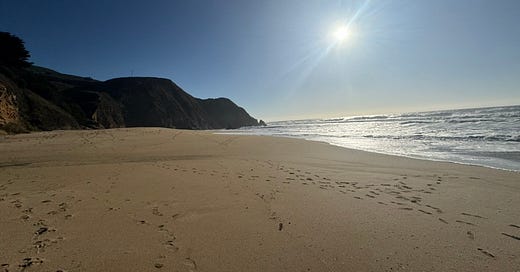Never turn your back on the ocean
One nice thing about San Francisco is that you can drive fifteen minutes to a beautiful beach that is completely empty—except for an inexplicably nude man with bronze skin doing calisthenics in the distance, and another pointing a telephoto lens at the circling gulls. Have you ever noticed, by the way, that birds have a danger radius? Birds on the ground will begin walking away when you approach within a distance that depends on the species. Quails will allow you as close as five feet; seagulls keep fifteen or twenty. When you are brandishing a camera and walking purposefully, as I was, nudists also seem to have a danger radius—forty to sixty feet.
I sit down somewhere outside their radius and press my fingers into the coarse, warm, sand. The sound of a wave changes from a rumble to a hiss to nothing as it breaks and flattens. The water leaves a band of foam at its highest reach, and carves interlocking diamond runnels into the sand as it recedes. I begin to suspect that the angles in those diamonds are related to the slope of the ground, the density of water, and the strength of self-adhesion in the wet sand. I think about the pebbles scattered here and there, and the distribution of grain sizes, and how that distribution evolves as the beach ages. It seems to me that a beach must start with a bimodal distribution: many large, immobile boulders, and an extremely fine grit worn from the rocks by the action of the water. After a long, long time, some of the boulders are cut down to smaller stones that move with the waves. These strike the remaining boulders and each other, generating fragments. As the proportion of mass that moves with the waves increases, so does the destructive power of each rush of water; the process accelerates. And then suddenly, everything is sand.1
My upbringing, my peer group, various jobs, and the online content farm have presented me with a singular message: you should be working harder on improving your skills, and you should be using those skills to do something important. I guess so; maybe I should. But even if it would mean wealth, or recognition, or accolades, I wouldn’t abandon any of my fascinations to study whatever field is currently in vogue. I enjoy discovering the similarities in the trees even if someone else saw them first. I like those math problems whose solutions leave you with no useful knowledge and a lasting resentment for Diophantus of Alexandria. And I find such a strange pleasure in thinking about the sand.
It’s probably logistic, because smaller particles have a lower terminal velocity, and if more stuff is moving with the water the mean relative velocity is lower. There are also likely effects due to changes in total cross-sectional area. I’ve never waited long enough to find out.




